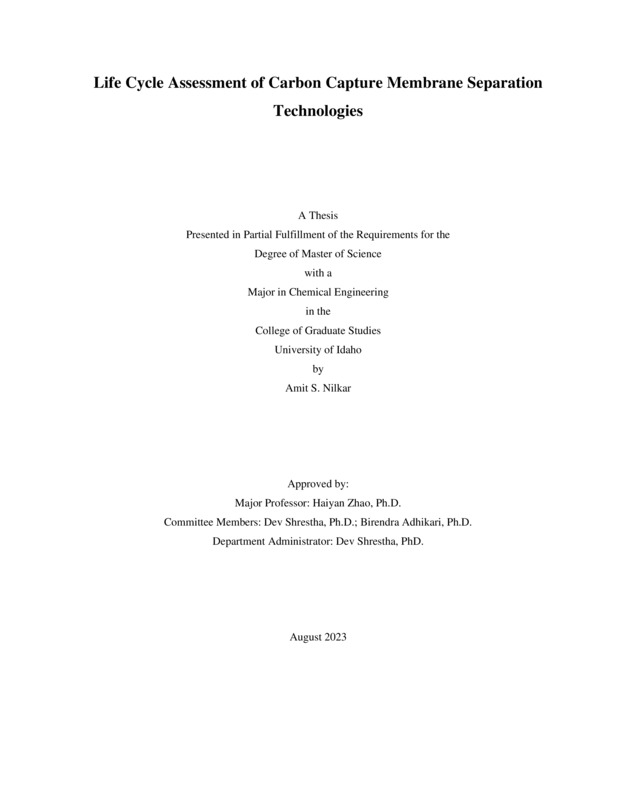Life Cycle Assessment of Carbon Capture Membrane Separation Technologies
Nilkar, Amit S. (2023-08). Life Cycle Assessment of Carbon Capture Membrane Separation Technologies. Theses and Dissertations Collection, University of Idaho Library Digital Collections. https://www.lib.uidaho.edu/digital/etd/items/nilkar_idaho_0089n_12665.html
- Title:
- Life Cycle Assessment of Carbon Capture Membrane Separation Technologies
- Author:
- Nilkar, Amit S
- Date:
- 2023-08
- Program:
- Chemical & Biological Engineering
- Subject Category:
- Chemical engineering
- Abstract:
-
Carbon capture has been a significant topic due to elevating carbon dioxide (CO2) levels in the atmosphere. CO2 in the atmosphere is above 420 parts per million (ppm) as of 2022, 70 ppm higher than it was 50 years ago. Carbon capture technologies (CCUs) are being heavily researched to tackle this problem. Researchers have been focusing on developing processes that can capture carbon dioxide from existing sources and utilize it to produce commercial products such as methanol, ethanol, fuels, etc. However, not all these processes may be environmentally feasible, as it has been established that some of these processes end up doing more harm to the environment. Capture technologies such as solvent-based, adsorption-based, cryogenic distillation, and pressure-swing adsorption are currently being researched, but are associated with higher costs and have historically been unsustainable. Membrane-based carbon capture technologies are considered economical and environmentally friendly alternatives. Idaho National Laboratory (INL) researchers have been developing new types of membranes for the last 30 years, one of them being polyphosphazene polymer membranes, specifically Poly[bis((2-methoxyethoxy)ethoxy)phosphazene] (MEEP), which has demonstrated the highest selectivity for CO2 over nitrogen (N2). Life cycle analysis (LCA) has become a crucial step in evaluating carbon capture processes for their suitability to be utilized on a small and large scale. An extensive life cycle assessment (LCA) was performed to determine the environmental feasibility of the entire life cycle of the MEEP polymer material compared to other CO2-selective membranes and separation processes. The MEEP-based membrane processes have been shown to produce at least 42% less equivalent CO2 emissions than Pebax-based membrane processes. Similarly, MEEP-based membrane processes produce 34–72% less CO2 than commercial separation processes. In all studied categories, MEEP-based membranes report lower emissions than Pebax-based membranes and commercial separation processes.
- Description:
- masters, M.S., Chemical & Biological Engineering -- University of Idaho - College of Graduate Studies, 2023-08
- Major Professor:
- Zhao, Haiyan
- Committee:
- Adhikari, Birendra; Shrestha, Dev
- Defense Date:
- 2023-08
- Identifier:
- Nilkar_idaho_0089N_12665
- Type:
- Text
- Format Original:
- Format:
- application/pdf
- Rights:
- In Copyright - Educational Use Permitted. For more information, please contact University of Idaho Library Special Collections and Archives Department at libspec@uidaho.edu.
- Standardized Rights:
- http://rightsstatements.org/vocab/InC-EDU/1.0/

